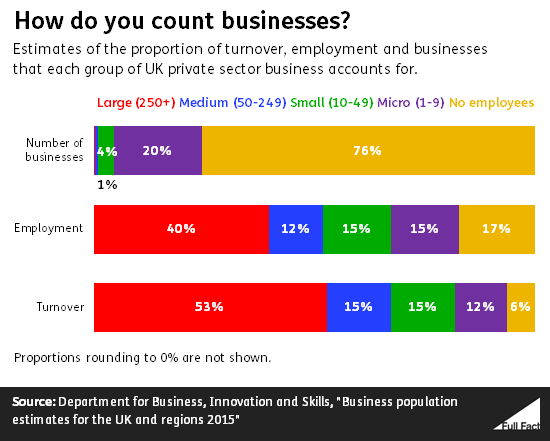What do businesses think about the EU referendum?
There aren’t any representative surveys of business opinion that we’re aware of
It’s difficult to get a representative picture of UK business opinion about the EU. As far as we’re aware, there aren’t any surveys that offer this on the UK’s membership of the EU.
Surveys carried out by business membership bodies suggest that, among their members, larger businesses are more likely to want to stay in the EU, and smaller businesses are more divided on the issue.
It is hard to go further than that.
These are surveys of businesses that have chosen to join membership bodies. There are difficulties ensuring the surveys are representative of all members of those organisations and they will not be representative of businesses generally.
The Confederation of British Industry has pointed to 19 polls which it says show “all polls bar none show a majority of businesses want to remain in the EU”. These all face the same limitation—the vast majority are surveys of membership organisations, and the rest aren’t designed to be representative of the opinion of all UK businesses. They include:
- an survey by Deloitte of chief financial officers on its panel of UK companies making at least £1 million a year, with unweighted results
- a survey by private equity firm ECI of growth-focused companies
- a survey by Goldman Sachs of small businesses taking part in its small business programme
- a survey by financial adviser Grant Thornton UK LLP of some 125 senior staff at medium sized businesses
- a survey by Ipsos MORI of 100 senior figures in top UK companies
These surveys also often weren’t conducted in a way which made them representative of the types of businesses they were surveying, let alone of all businesses generally.
For example, the latest British Chambers of Commerce member survey showed a big difference in opinion between the exporters they surveyed, who were more likely to favour remaining in the EU, and the non-exporters, who slightly favoured leaving. That makes a difference to its overall results because the number of exporters among the respondents was disproportionately high.
Surveying business opinion is tricky
The bigger point here is that is very difficult to work out what types of businesses you’d need to survey, and what weights you would apply, to make the results representative of all businesses. For example, is it better to aim to represent the different numbers of employees of businesses, or how much money they make, or what sector they work in?
As the graph below shows, the different weights given to different business sizes can vary significantly depending on what you’re measuring.

The other significant variation is industry, where different industries will have different levels of trade with the EU.
For all these reasons there are no representative surveys of business opinion on the EU referendum.
Some things we do know
There are some things we do have a more complete answer for.
Businesses have talked about the economic impact of leaving the EU, and how the referendum might affect trade, for example. We’ve got information about what the economic forecasts say about the impact of leaving the EU here, and about the UK’s trade with the EU—including how that might be affected if we left the EU—here. Or if you want to find out about the impact of EU regulation on businesses, we’ve covered that here.
Well known business people have come out on both sides of the debate, and just as with individuals, different businesses will be affected differently.